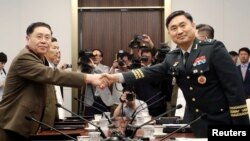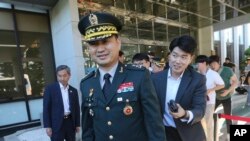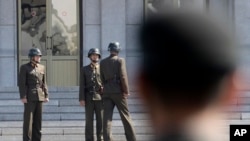Inter-Korean military talks have so far yielded trust building measures, but no significant reductions in troops or artillery at the border
Military delegations from North and South Korea held talks on Tuesday in the truce village of Panmunjom, within the demilitarized zone (DMZ) border region, the same site where North Korean leader Kim Jong Un and South Korean President Moon Jae-in met in April.
The military leaders discussed how they might implement the security related aspects of the inter-Korean summit agreement to ease border tensions and “cease all hostile acts against each another.”
The two sides exchanged views on possibly reducing the number of military forces and arms in the DMZ and to conduct a joint excavation in the border area for the remains of soldiers that were killed in the Korean War.
The four-kilometer wide DMZ along the 250-kilometer inter-Korean border is one of the most heavily fortified borders in the world, guarded by thousands of troops, artillery and littered with landmines.
In April, Kim and Moon agreed to transform the DMZ, and the Northern Limit Line that extends the borderline out to sea, into peace zones to prevent accidental military clashes.
But the two sides were unable to reach an agreement to release a joint statement on progress made at Tuesday’s meeting.
General Kim Do-gyun, the South's chief negotiator who is in charge of North Korea policy at the Ministry of Defense, said Tuesday’s talks were meaningful in "creating understanding" in ways to implement the summit agreement.
Ahn Ik-san, the general leading the North Korean delegation at the military talks, said both sides agreed on "some issues," without elaborating.
Confidence building
In terms of concrete measures to be taken, General Kim said the two sides agreed to pull out guard posts on a trial basis within the Joint Security Area (JSA), a particularly tense part of the DMZ, where North and South Korean forces stand face-to-face.
Cho Seong-ryoul, a senior researcher at the Institute for National Security Strategy in South Korea, said such a pullback within the JSA is small but significant progress.
“In order to reduce the military forces and weapons in the border area, it is necessary to remove the guard posts, as well as to withdraw military forces and its heavy weapons in the demilitarized zone. This would be a meaningful measure that could prevent accidental conflicts between the two Koreas,” he said.
North Korea analyst Robert Kelly with Pusan National University in South Korea said the limited gains made at the military talks reflect the tough and prolonged negotiation process ahead to move North Korea beyond confidence building measures and to make real concessions to downsize its military forces at the border.
“I mean that is one of the reasons why this thing is going to take forever, right, because the North Koreans aren’t going to do it unless we do it. And we’re not going to do it unless they do it. So everybody is sort of watching everybody else,” said Kelly.
Denuclearization link
Increased inter-Korean cooperation to ease cross border tensions and improve relations is also tied to U.S.-North Korea denuclearization talks that seemed to have stalled following the Singapore Summit in June between Kim and U.S. President Donald Trump.
“In the situation where there is no progress regarding North Korea’s denuclearization, it is difficult to implement the substantive issues, such as the operational arms control or reduction of weapons,” said Cho, who is also a member of advisory group for President Moon Jae-in.
Washington and Pyongyang remain at odds over U.S. demands that the North give up its complete nuclear arsenal before concessions would be granted, versus the North’s call for early sanctions relief.
This week, U.S. spy satellites reportedly detected renewed activity at the North Korean factory that produced the country's first intercontinental ballistic missiles capable of reaching the United States. U.S. Secretary of State Mike Pompeo last week also told a U.S. Congressional committee that North Korea was continuing to produce fuel for nuclear bombs.
Both Pompeo and North Korean Foreign Minister Ri Yong-ho will attend the ASEAN East Asia ministerial summit in Singapore this week. There is no planned meeting between the two leaders, but the State Department said there is a possibility they will hold talks on the sideline of the conference.
Inter-Korean limitations
South Korea is restrained from offering the significant concessions that the North most wants. Seoul says it cannot restart economic cooperation until international sanctions that ban 90 percent of North Korean trade are lifted.
At the inter-Korean military talks, the head of the North Korean delegation also pushed for Seoul’s support for a joint declaration with the United States to formally end the war.
The Korean War ended in an armistice, not a peace treaty, leaving U.S.-led United Nations forces, including South Korea, technically still at war with the North.
But Washington has indicated it would not support a peace treaty or peace declaration until there is denuclearization progress.
The Rodong Sinmun, North Korea's official party newspaper, recently accused Seoul of "wasting time" waiting for sanctions to be lifted only after denuclearization is completed, without "taking a single action" on its own.
Lee Yoon-jee contributed to this report







